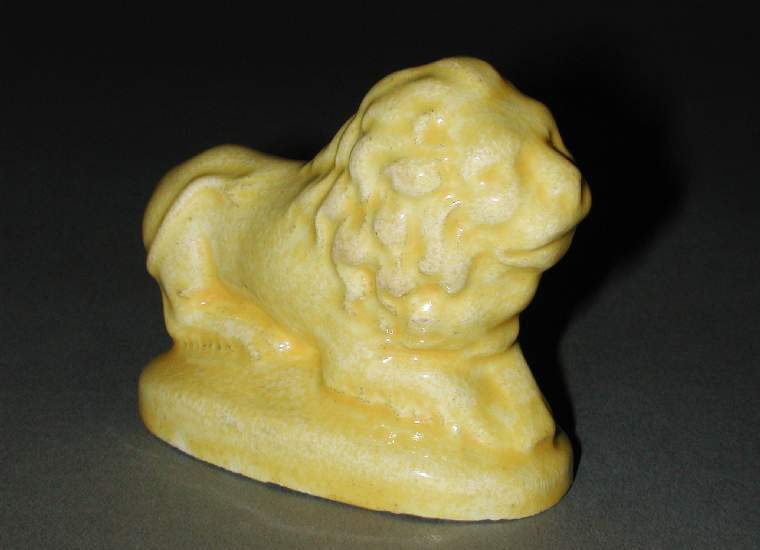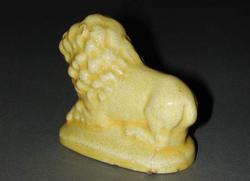Current Location: Gallery 27 (Glaisher)
Titles
Lion
Maker(s)
Unidentified factory
Entities
Categories
Description
Earthenware figure, moulded and coated with yellow lead glaze.
Small animal figure of a lion resting, forepaws together, on a slightly domed oval base. The underside is open and the whole piece has been dipped in a lemon yellow glaze.
Notes
History note: G.H.W. Rylands, Litt.D., CBE, CH, King's College, Cambridge
Legal notes
Given by G.H.W. Rylands in memory of his mother, Betha Wolferstan Rylands
Measurements and weight
Height: 5.8 cm
Length: 6.5 cm
Width: 3.7 cm
Acquisition and important dates
Method of acquisition: Given
(1997-10-13)
by
Rylands, G.H.W.
Dating
19th Century, Early
George III
George IV
Circa
1800
CE
-
1830
CE
Note
Small, simply modelled and plain glazed figures of animals and birds, like this one, were cheap to produce and popular. More complex pottery lions were also made, sometimes colour glazed but more often painted under or over a clear lead-glaze. The Fitzwilliam collection holds several based on classical examples.
Yellow glazed earthenwares were produced by a number of English potteries during the late 18th and early 19th centuries. The yellow colour of earlier examples was produced from a mix of litharge (lead monoxide), antimony and tin or lead ash, with proportions varied to produce different tones. From around 1830, chrome pigment became available as a simpler alternative. Very few pieces of yellow-glazed ware are marked, but those that are show that makers included at least nine Staffordshire potteries, including Wedgwood, Spode, Enoch Wood and John Shorthouse, as well as potteries in Rotherham, Leeds, Newcastle-on-Tyne and Sunderland.
Components of the work
Decoration
composed of
lead-glaze
( yellow)
Materials used in production
Earthenware
Techniques used in production
Moulding
: Earthenware, moulded, and lead glazed.
References and bibliographic entries
Identification numbers
Accession number: C.85-1997
Primary reference Number: 76230
Stable URI
Audit data
Created: Saturday 6 August 2011
Updated: Monday 29 April 2024
Last processed: Tuesday 13 May 2025
Associated departments & institutions
Owner or interested party:
The Fitzwilliam Museum
Associated department:
Applied Arts





